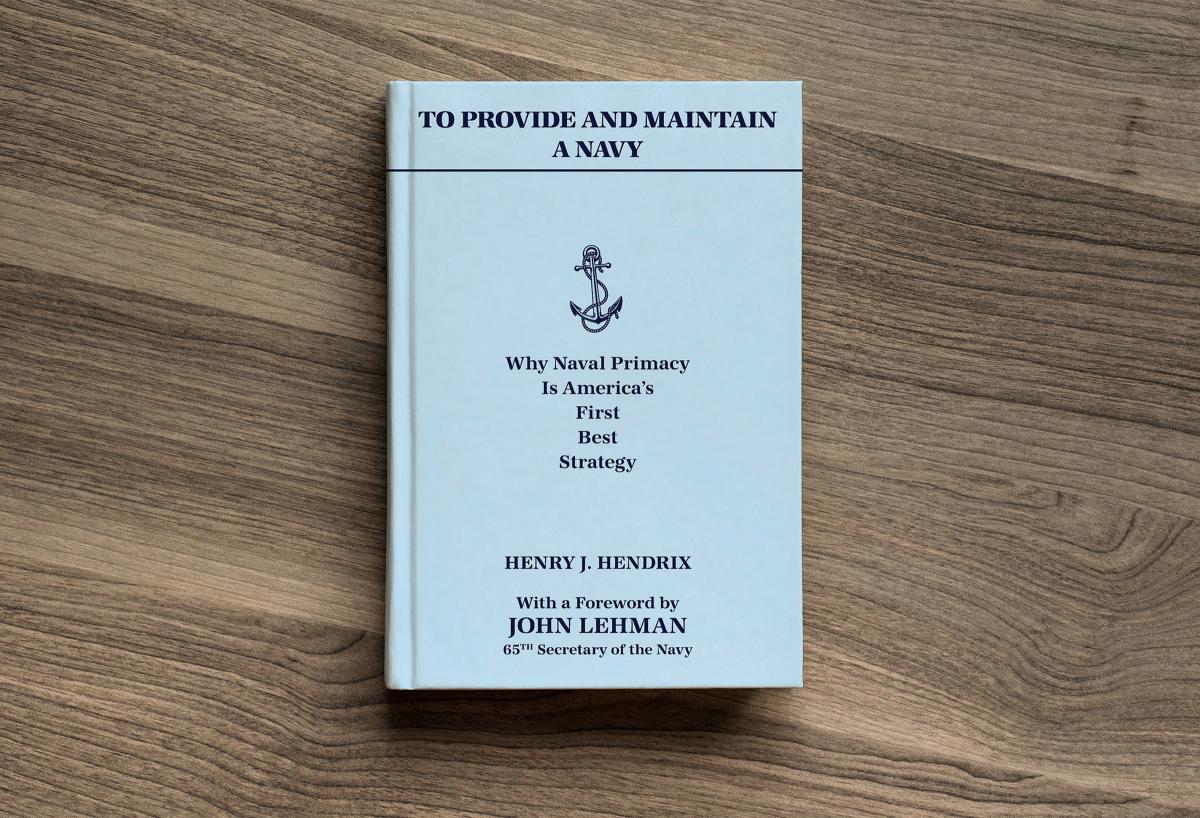To Provide and Maintain a Navy: Why Naval Primacy is America’s First Best Strategy
Henry J. Hendrix. Annapolis, MD: Focsle, 2020. 123 pp. Notes. $20.
Reviewed by Commander BJ Armstrong, U.S. Navy
The ideals of sea power date back centuries. From the triremes of the Peloponnesian War to the longboats of the Vikings, the use of the maritime world for the purposes of trade, competition, and war has been a fundamental part of the human experience. Today, however, the idea of fighting on and about access to and use of the sea appears to many as a relic of that history. Dr. Jerry Hendrix’s book, To Provide and Maintain a Navy, offers a much-needed corrective to that belief. In a succinct argument, throughout engaging chapters, the retired naval officer and accomplished naval historian demonstrates that the United States must return to its maritime and sea power roots to be successful in the 21st century–era of renewed great power competition.
This book is short. And that, perhaps, is one of its greatest strengths. Hendrix explains the core argument that to succeed in the 21st century, the United States must look to the sea. Unlike a lot of other naval writing, it makes few assumptions about readers’ familiarity with maritime subjects. Instead of an exhaustive examination of U.S. maritime power, it offers a primer for the interested U.S. citizen. Short enough to be read over a single weekend, the book offers part legal brief, part historical summary, part net assessment of today’s great power competition, and part projection toward the future.
Hendrix begins with a philosophical question of identity, illuminating the different perspectives of land powers and sea powers. Applying the ideas introduced by Andrew Lambert in his recent book, Seapower States (Yale University Press, 2018), Hendrix returns to the question repeatedly throughout the text. In the United States, how people see themselves and their role in the world is fundamental to the foreign policy and defense policy of the nation. In one view, the United States is a continental land power that sees the world as territory to be invaded, occupied, or “developed” through expeditionary military engagement. In the competing view, the United States is a sea power that sees the world as a network in need of maintenance, where power is derived from ensuring that the economics, diplomacy, and influence of the nation can be grown and exercised in pursuit of its interests.
To Provide and Maintain makes the case that for a democracy such as the United States, a nation that historically has been focused on economic power as much as military power and has placed a high value on diplomacy as much as war, a sea power strategy is not only more effective, but also more in line with the nation’s values. To be a sea power, however, the nation must follow the instructions of the Constitution and “provide and maintain a Navy” of sufficient power.
In addition to the philosophical and strategic argument, the book assesses the continentalist great powers that challenge the United States’ role in the world today: China and Russia. The rise in the naval ambitions of these two powers is shown in contrast to the decline of the U.S. Navy over the past several decades, both in size and in capability. Finally, Hendrix lays out a path for American naval rebuilding that he says will offer the United States what it needs to reestablish itself as a sea power in the 21st century.
For today’s sailors and Marines, this book offers a clear view of what it is the Navy and Marine Corps do and why we do it. For leaders and politicians in the halls of power, it offers a clear-eyed assessment of the current state of great power competition. For U.S. citizens, it gives a rationale for naval power and a clearly written explanation of today’s maritime world. Jerry Hendrix calls us to once again look outward, as Alfred Thayer Mahan suggested, and realize the nation’s connection to the maritime world is one of its fundamental strengths.
Making the hard choices needed to reinvest in the Navy and Marine Corps may seem difficult, but To Provide and Maintain makes a clear and credible argument that it is the path to the nation’s best strategy for the future.
Commander Armstrong is a permanent military professor with the U.S. Naval Academy History Department. He earned his PhD from King’s College, London, and is the author of several books.
Operation Hermes
Glenn Voelz. Gleneden Beach, OR: First Steps Publishing, 2020. 300 pp. $19.
Reviewed by Captain Bill Bray,
U.S. Navy (Retired)
Operation Hermes is Glenn Voelz’s sequel in his Gisawi Chronicles series, to War Under the Mango Tree. Gisawi is a fictional sub-Saharan African country that resembles many sub-Saharan African countries—nations of raw beauty brimming with natural resources, political instability, corruption, and plenty of ungoverned or poorly governed space in which terrorists and other bad actors tend to flourish. Avaricious corporations and states hostile to U.S. interests see plenty of opportunity to stick it to Uncle Sam and make a quick buck as well, and it is from this exotic cauldron of shadowy intrigue that Voelz conjures a tightly wrought, edgy, and satirical thriller.
At the novel’s outset, Gisawi is a U.S. ally. But following a U.S.-enabled high-tech manhunt that kills a notorious warlord, the country’s fragile stability begins to come unglued. Panicked, Gisawi’s autocratic and justifiably paranoid president begins to doubt the United States’ resolve and turns to China for support. The Great Game is on. Voelz’s cast of very realistic U.S. intelligence, military, and State Department characters finds it tough going, navigating the shifting loyalties and duplicities that pile up as a mad scramble for power ensues. On top of that, the narrative includes a healthy helping of the foreign affairs expert’s nagging paradox—those who seem to know the local actors best are least able to recognize what is really going on in a crisis.
If that scenario seems implausible, it should not. I got a taste of what U.S. diplomats and intelligence professionals deal with on the continent when I served in East Africa in 2006. A year later, the U.S. Ambassador to Kenya cabled from Nairobi the rosiest of projections for an orderly national election two weeks hence. Within a week following the election, the country had descended into ethnic violence so severe it teetered on becoming the site of the world’s next genocide. A few years prior to that, one of my analysts was the most recent defense attaché to Liberia and knew all the players there personally. He could not be persuaded that then-President Charles Taylor was about to flee the country, regardless of mounting evidence to the contrary.
And, finally, I once took a class from a retired CIA officer who had been the station chief in Libya for three years when, in 1969, Muammar Gaddafi engineered a successful coup d’état. The CIA officer told me he thought he knew every Libyan Army officer, yet he never heard of Gadaffi or saw the revolt coming. Too much? Perhaps, but the more a reader knows about Africa, the more real Gisawi seems.
And Voelz knows a thing or two about his settings, having spent 25 years in the Army as an intelligence officer that included time on the continent. His eye for detail is informed by experience. And, unlike so many of his contemporaries in the genre, his character development equals that of plot, and the dialogue is sharp and believable to anyone who has been in these crisis action rooms.
Readers will not know whether to laugh or wince at the futile U.S. efforts to influence events on the ground. It seems, to quote Christopher Hitchins’ take on Graham Greene’s perception of similar MI-6 misadventures, the interagency team is a place of “collapsing scenery and low comedy.”
If anyone who has ever followed some of the actual foreign policy debacles in the past gets the sense in reading Operation Hermes that he or she has read it all before, it is because they have.
Captain Bray is a retired naval intelligence officer and the deputy editor-in-chief of Proceedings.
2034: A Novel of the Next World War
Elliot Ackerman and Admiral James Stavridis, U.S. Navy (Retired). New York: Penguin Press, 2021. 320 pp. $27.
Reviewed by Commander J. D. Kristenson, U.S. Navy
The recently released novel, 2034: A Novel of the Next World War, is a troublingly plausible account of what a future war for uncontested control of the South China Sea could look like. In its telling, authors Elliot Ackerman and retired Admiral James Stavridis draw on their unimpeachable military backgrounds and writing résumés to bring forth a work of great depth.
The authors cast their narrative in a believable context; the backdrop is an imaginative extrapolation of present-day events into the near future of 2034. It is set in a world formed in the aftermath of the COVID-19 pandemic and further remapped by China’s expansive Belt and Road Initiative. There are indeed a few progressive details of their vision of the year 2034—such as a female U.S. President unaffiliated with a political party and a U.S. attack submarine named the USS Michelle Obama—that seem positively wistful in today’s political climate. Perhaps least surprising though, an 82-year-old Vladimir Putin is still desperately clinging to power in Russia. Ultimately, the novel is not meant to be perfectly predictive, but rather to project an imaginative vision of what might come to pass.
Many readers can remember the events of 2007, when, halfway through the George W. Bush administration’s second term, the first iPhone was launched. There is a corresponding truth that is not always as keenly felt, however: 2034 is as close to our future as 2007 is to our past. As such, this setting it is all too close at hand. 2034 paints a bracing picture of the United States, with an increasingly irrelevant military technological advantage and an overstretched empire with a sclerotic imagination. Despite the imminent risks, America still is clinging to technology that no longer serves its security interests.
Then, on a single, terrifying day, China shakes America’s faith in its military’s strategic preeminence, and a fragile new era is born. U.S. naval power is outdated and overmatched because of a massive underinvestment in offensive cyber capabilities. A likely war between the United States and China is the most dangerous scenario facing the world. Yet, it is the regional powers—Iran, Russia, and India-—that emerge as most important as the U.S. crisis response follows a familiar choreography of disappointing and predictable moves and countermoves: posturing, brinksmanship, deescalation, and compromise.
The authors do a marvelous job depicting the human cost of large-scale geopolitical conflict. They manage to steer clear of making future technology and military hardware the main characters. Instead, they have crafted a chillingly authentic geopolitical thriller. At its core, 2034 is a realistic look at how a nightmarish path to global conflagration might come to be and the staggering costs of waging it. This cautionary tale presents the reader with a dark yet possible future that the nation must do all it can to avoid.
The global balance of power is never permanent, and the end of empires often comes from within. America remains an idea that stubbornly refuses to vanish, but today’s military policies both add and remove tomorrow’s options. Sometimes, it takes a brilliant work of fiction to raise the questions that nonfiction authors write around. What happens when Chinese ambition outweighs its prudence or when the United States’ hubris outweighs its greatness? If the Pacific Ocean does not prove big enough for the United States and China, who will we then find ourselves to be?
Commander Kristenson is a Navy surface warfare officer and an Olmsted Scholar (China). He previously commanded the USS Champion (MCM-4), where he led a “damn fine crew of iron men on a wooden ship.” He most recently served ashore as a special assistant to the Supreme Allied Commander of NATO and is headed back to sea to lead the fight on the USS Michael Murphy (DDG-112).
Dan Schilling and Lori Chapman Longfritz. New York: Grand Central Publishing, 2019. 333 pp. Biblio. $17.99.
Reviewed by Dustin League
In Alone at Dawn, authors Dan Schilling and Lori Chapman Longfritz are on dual missions. The first, to tell the story of one exceptional airman and how he came to sacrifice his life to save his comrades-in-arms. Their second mission to shine a light on what may be the least well-known, and most lethal, community in the U.S. armed forces. In both missions, they succeed by allowing the facts of the events speak for themselves, without mythologizing or embellishing.
Air Force combat controllers, like the Navy’s SEAL teams and the Army’s Delta Force, are part of the U.S. military’s Special Operations Forces. Their role is to coordinate air power from the ground level, ensuring accurate delivery of ordnance on enemy targets or supply drops to support humanitarian efforts. As Alone at Dawn reveals, efforts of individual combat controllers can have outsized effects in combat, sometimes altering the course of entire battles. In one illuminating detail, the authors note that three combat controllers, protected by small special forces teams, accounted for 60 percent of all enemy casualties in one of Afghanistan’s largest and fiercest battles.
John Chapman’s story is the heart of Alone at Dawn, following him from high school, through his training and career as a combat controller, and eventually to his final stand and death in Afghanistan. Along the way, the authors, including Chapman’s sister, give us insight into the kind of man he was—what drove him to join first the Air Force and later the incredibly elite and demanding combat controllers.
The authors do an excellent job of showing Chapman’s whole life, of which being a combat controller was only one aspect. The effort to humanize, rather than mythologize, makes the story of his last stand all the more moving. Chapman was not some action movie hero, but a family man simply doing his job when he gave his life in Afghanistan. The chapter detailing the effort needed to upgrade Chapman’s Air Force Cross to a Medal of Honor resonates so strongly because the authors have given the reader all the background they need to understand his actions.
Alongside the story of Chapman, the authors explore the story of the combat controller community itself, from its roots in Vietnam to today. Descriptions of intense training regiments and combat professionalism come alive with details. That one of the authors was a combat controller certainly helps, as do the numerous times the authors allow other controllers to speak for themselves through interviews. The ground-level views of combat are visceral but never gratuitous. The authors artfully portray the management of the tremendous airpower of gunships, fighter jets, attack helicopters, and surveillance platforms, while the Delta and SEAL teams with which combat controllers are embedded protect them from Taliban fighters.
The writing of Alone at Dawn is consistently compelling. Battles come to life with action and intensity, and the authors excel at re-creating the stress and pressure Chapman and his colleagues would find themselves routinely facing. This rare historical account reads with the pace of an action novel.
For anyone interested in learning more about the role special forces played in Afghanistan, or the poorly known combat controller community, this is a must read. It combines the narrative of a single dedicated airman with a clear history of a lethal and not well-known community. Highly recommended.
Mr. League is a military operations analyst and former U.S. Navy submarine officer. He studies submarine warfare issues for the U.S. and Australian navies.









